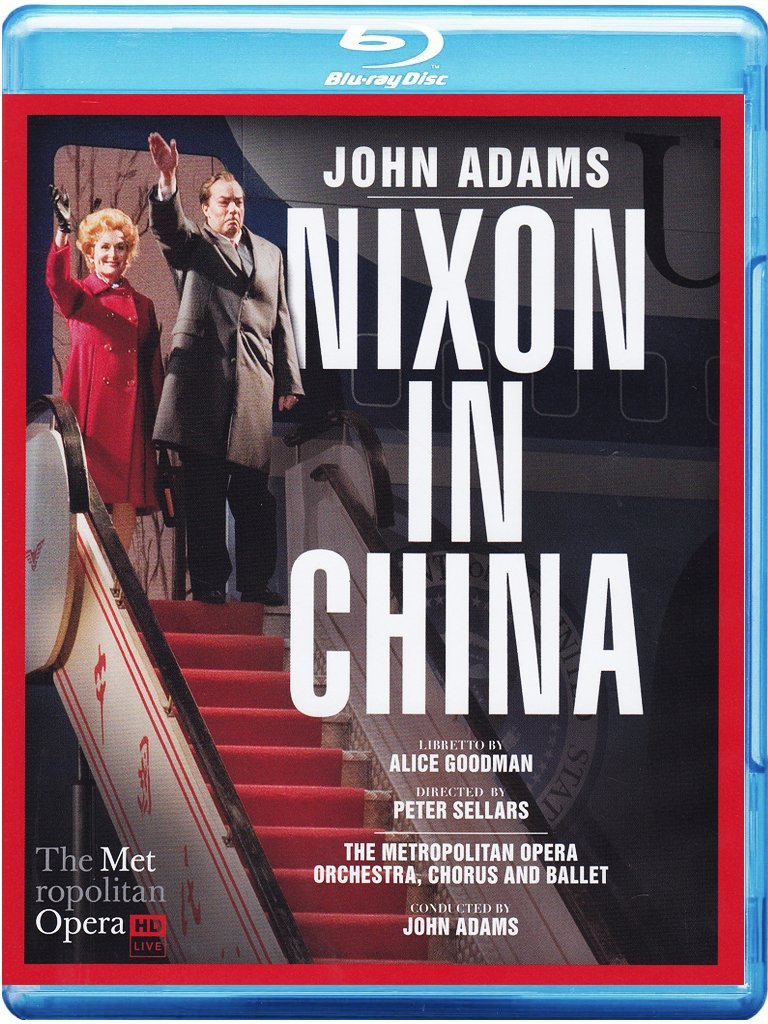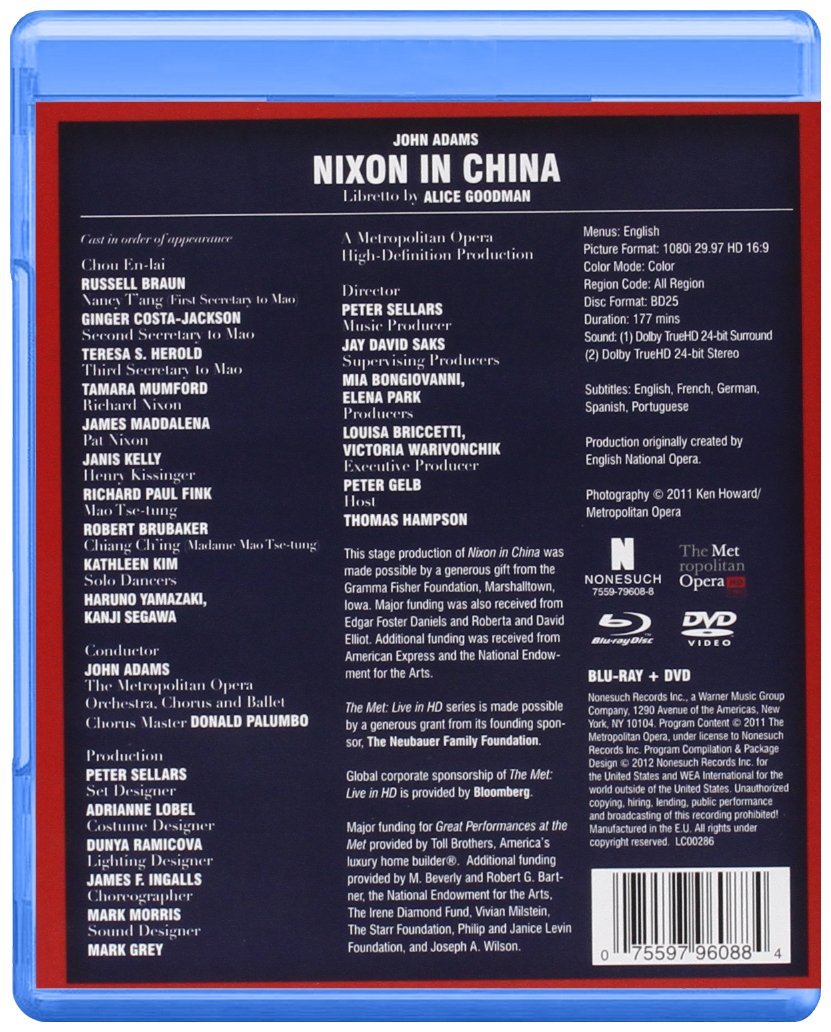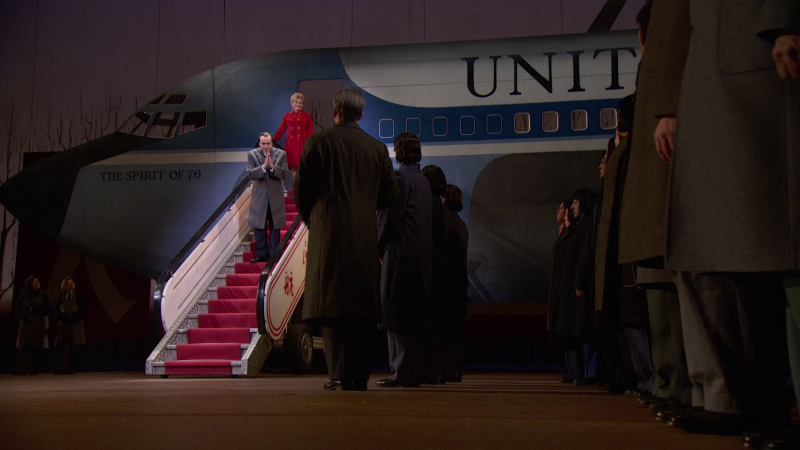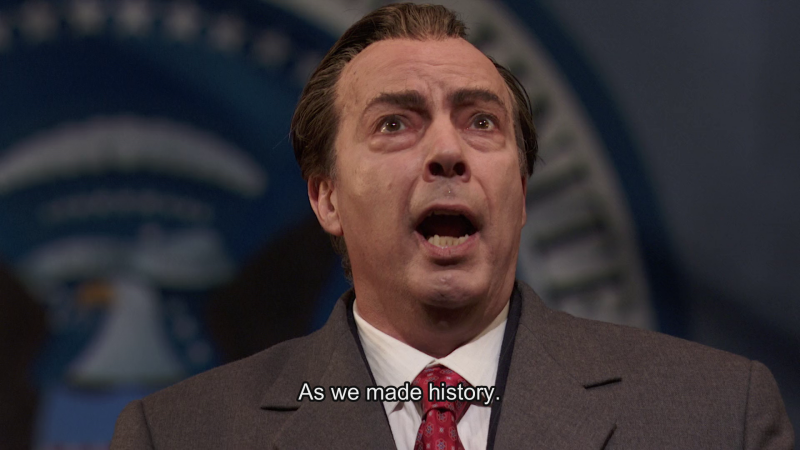

John Adams Nixon in China opera to a libretto by Alice Goodman. Directed 2011 by Peter Sellars at the Metropolitan Opera. Stars singers (order of appearance) Russell Braun (Chou En-lai), Ginger Costa-Jackson (Nancy Tang, First Secretary to Mao), Teresa S. Herold (Second Secretary to Mao), Tamara Mumford (Third Secretary to Mao), James Maddalena (Richard Nixon), Janis Kelly (Pat Nixon), Richard Paul Fink (Henry Kissinger), Robert Brubaker (Mao Tse-tung), and Kathleen Kim (Chiang Ch'ing [Madame Mao Tse-tung]), as well as dancers Haruno Yamazaki and Kanji Segawa. John Adams (the composer) conducts the Metropolitan Opera Orchestra, Chorus (Chorus Master Donald Palumbo), and Ballet. Produced by Peter Sellars; set design by Adrianne Lobel; costume design by Dunya Ramicova; lighting design by James F. Ingalls; choreography by Mark Morris; sound design by Mark Grey. Released 2012, disc has Dolby TrueHD 24-bit sound. Grade: A-
I personally lived through Nixon going to China, and I had my doubts whether one could write a tolerable opera about that event. I watched Nixon in China cold and found it much more interesting than I thought it would be.
The music is similar to Glass and Reich, but more variable with many shifts required by the libretto. The general effect is quite pleasant in the same way that movie soundtracks are. But I'm sure the score is really much better than that once you get your mind wrapped around it. And, of course, it's brilliantly directed (by the composer), played, and recorded by the Met folks.
The picture resolution is just OK and picture quality is decent but not as good as other Met operas published lately. But I think the picture content is fine with a variety of enjoyable angles and good editing. A wish I knew who to credit for the video, but I could not figure out who was responsible. I think whoever produced the HD feed to the movie theaters for this show also gets credit for the Blu-ray product. The innovative and generous Nonsuch package has a DVD along with the HDVD. The DVD doesn't succeed; the HDVD does, but there's room for improvement. To have a fully satisfactory video of a venue as large as the Met stage, we need a next-generation "4K" display.
The libretto is hugely challenging with a bizarre mixture of actual history, serious discourse, satire, wild fantasy, and physical comedy. And the work is more meaningful now than when it was when first produced in 1987 because we know today something about what history had in store for both China and the U.S. It would take a lot of study of history and the libretto to tease out all the ideas that Sellers and Goodman installed in this. Here are just a few of the questions I wish I had time to try to answer:
- What really was said at the conference with Mao Tse-tung and the state dinner that took place soon after Nixon arrived? How much of Act 1 is history and what is literature?
- What really happened at the propaganda ballet that gets so out-of-control in Act 2?
- Act 3 depicts the intimate thoughts of each the main characters as they go to bed for the last night of the Nixon visit. Were Mao and his wife really sexual reprobates? Was Chou En-lai as noble a character as depicted?
- I noted somewhere that Nixon in China was conceived as an "anti-grand opera." What does that mean?
- Is the libretto available for study without the score? Is there an annotated text what gets into all the topical allusions and insider jokes? For example, Nixon refers to a "long march" he proposes to attain the goal of Peace. Well, maybe some viewers don't know that the Mao's great, fabled military triumph was called "The Long March." Did Nixon really use the "long march" reference in his pitch? Or was this added by Goodman? When I watched the opera, I "got" some of the clever stuff, but I had the feeling that I was missing much of it.
Well, now to some screen shots. I was surprised to see how many shots are needed to do this work justice. And I regret so many shots I deleted! I think this is due to the fact that Nixon in China is an opera of ideas like no other, and each idea wants to have it's own picture taken!
You have to start with Air Force One. It arrives coming straight down like a helicopter. Nixon (James Maddalena) and Pat (Janis Kelly) are greeted by Chou En-lai (Russell Braun), who has his back to us here:
Nixon is enamored of his role in history, which is minuscule compared to accomplishments of the leading Chinese figures he is visiting. So he keeps talking about it:
Nixon really did make history later when he became the only U.S. president forced to resign (after getting caught in the cover-up of a politically-inspired burglary). I'll brag that I never voted for Nixon, chiefly because I viewed him as a politician never without a platitude:
Mao Tse-tung immediately summons Nixon to a conference. Mao is not a mere head of state; he is Chairman of the Chinese Communist Party. This will be Nixon's only meeting with Mao during his visit. Everything else Nixon does will be handled by Chou En-lai, the head of the Chinese government. Mao is cordial, but he confounds Nixon by contradicting Nixon repeatedly and by speaking with Delphic ambiguity. Here Nixon tries to flatter Mao:
But Mao has more important things on this mind. Addressing Henry Kissinger (Richard Paul Fink), Mao asks:
Nixon parries this with a sense of humor:
Nixon starts to show off his knowledge of the names (just recently memorized) of Chinese political figures. Mao directs Nixon to take up any such business with Chou En-li, the head-of-state. Instead of dealing with concrete, practical matters, Mao states:
He shocks the Americans with this zinger:
I haven't yet mentioned the three secretaries (Ginger Costa-Jackson, Teresa S. Herold, and Tamara Mumford). They appear almost constantly throughout the opera serving as aids, nurses, translators, guides, informers, background singers, and strumpets. (They remind me of the Three Harlots in McMillian's Romeo and Juliet ballet.)
In an eerie passage, Mao jokes about the possibility of Chinese investment in the economy of the U.S. Now flash forward 41 years (2013 - 1972) and we see how Mao foresees the biggest fiscal problem now faced by Chinese leadership:
Nixon and Kissinger (Richard Paul Fink) are totally baffled by Mao's performance:
Nixon tries to rise to the occasion with some poetry of his own:
Mao ends the conference diplomatically:
News photos show there were some 20 large tables at the big state dinner; the Met has room for three. "Gam bei" means "dry cup"; I like the translation "bottoms up." PR at the time was (I personally remember this) that Nixon drained the cup as much as anyone, but that no alcohol was ever in it. Now I wonder:
Chou delivers a stirring toast* which we have set out below in full. I think this is are the actual words of Chou. It's a warm greating, of course. But I also read this as a "push back" against the excesses of Mao's Cultural Revolution, which was running its course when Chou toasted the Americans. So Chou was sticking his neck out here in several ways:
Reading from notes, Nixon responds with another string of platitudes‡:
In Act 2, Pat visits ordinary folks in a Potemkin tour. Here she's at a factory, vanguard of the Chinese assault that will lead to the destruction of much of America's manufacturing sector:
Pat tells the children that she used to be a teacher:
After the tour, there's a propaganda play (opera within the opera) produced by Madame Mao Tse-tung, Mao's wife. A vile landlord (played by Richard Paul Fink as an alternate to his main role of Kissinger) rapes the daughter of a tenant. Director Sellars, in a deliberate move aimed at eliminating any possible element of suspension of disbelief, leaves Kissenger's seat next to Pat Nixon empty while Fink plays the landlord role:
When the peasant girl protests, the landlord orders his bodyguards to kill her:
This is too much for Pat, who wants to intercede. Now we finally meet Madame Mao Tse-tung, seated center. She can't believe these stupid Americans would interrupt her play:
The play must go on:
And things get more chaotic with the aria "I am the wife of Mao Tse-tung":
To end Act 2, we get a taste of the "Great Cultural Revolution." Nixon arrived in China in about the middle of this huge purge of Chinese society during which Mao (and his wife) were inflicting the same kind of atrocities on the Chinese people that were complained of in the propaganda play. (After the end of the Great Cultural Revolution, Mao's wife was tried and sentenced to prison, where she committed suicide.)
Act 3 is short. Sellars puts a row of beds across the stage where each of the leading characters reveals their thoughts as they retire. Madame Mao is enjoying her tour of duty as murderous tyrant:
Chou, who is slowly falling out of favor for lack of fervor for the Great Cultural Revolution, fears he doesn't have much longer to live. (He died about 4 years later of bladder cancer.) His ghost then haunted the Chinese nation. This led to the events now known as the Tiananmen Square Protests, which set the scene for the abandonment of Maoism and the emergence of what we now think of as modern Chinese communism.
Now for a grade. I start with an "A" for the performance. I reduce this to "A-" for weaknesses in resolution and picture quality, which I attribute to the fact that this show was originally produced to be shown in movie theaters (where video quality is generally less than what we get at home on a good HD display).
*Chou En-lai's Toast:
Gam bei! Gam bei!
Ladies and gentleman, comrades and friends,
we have begun
to celebrate the different ways
that led us to this mountain pass
this summit where we stand.
Look down and think what we have undergone.
Future and past lie far below half-visible.
We marvel now that we survived those battles,
took those shifting paths,
blasted that rock to lay those rails.
Through the cold night uncompromising lines of thought
attempted to find common ground
where their militias might contend
confident that the day would come
for shadow-boxers to strike home.
We saw by the first light of dawn
the outlined cities of the plain
and see them still
surrounded by the pastures of their tenantry.
On land we have not taken yet
innumerable blades of wheat salute the sun.
Our children race downhill unflustered into peace.
We will not sow their fields with salt
or burn their standing crop.
We built these terraces for them alone.
The virtuous American and the Chinese
make manifest their destinies in time.
We toast that endless province
whose frontier we occupy from hour to hour.
Holding in perpetuity
the ground our people won today
from vision to inheritance.
From vision to inheritance!
All patriots were brothers once:
Let us drink to the time when
they shall be brothers again.
Let us drink to the time when
they shall be brothers again.
Gam bei! Gam Bei!
‡Nixon's Toast:
Mister Premier, distinguished guests,
I have attended many feasts
but never have I so enjoyed a dinner,
never have I so enjoyed a dinner,
nor have I heard played better
the music that I love outside America.
I move a vote of thanks to one and all
whose efforts made this possible.
No one who heard could but admire
your eloquent remarks, Premier,
and millions more hear what we say
through satellite technology
than ever heard a public speech before.
No one is out of touch.
No one, no one, no one is out of touch.
Telecommunication has broadcast
your message into space.
Yet soon our words won't be recalled
while what we do can change the world.
We have at times been enemies,
we still have differences, God knows.
But let us, in these next five days,
start a long march on new highways,
in different lanes, but parallel
and heading towards a single goal.
The world watches and listens.
We must seize the hour.
We must seize the hour.
We must seize the hour and seize the day.
Cheers!
To Chairman Mao!
Have you forgotten Washington?
Washington's Birthday!
Everyone listen! Listen!
Just let me say one thing.
I opposed China. I opposed China. I opposed China.
I was wrong!
I was wrong!
Cheers!
We must broadcast the seeds of goodwill.
Cheers!
To Chairman Mao! The USA!































